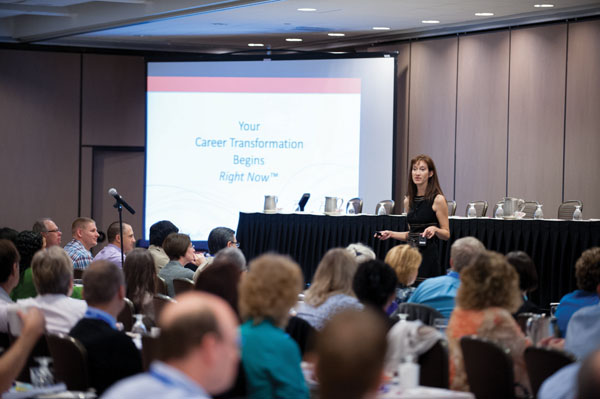Many physicians are now considering a career transition. How should physicians proceed with their career transition?
Physician career coach Heather Fork will be a keynote speaker at the SEAK Non-Clinical Careers for Physicians Conference October 22-23, 2016 in Chicago.
She will be speaking on: How to Plan and Execute your Successful Career Transition.
Here is a recent interview with Dr. Fork:
- Dr. Fork, what is the most common mistake you find physicians make in their career transition?
The most common mistake I see physicians make in their career transition is selling themselves short. I can’t tell you how many times I’ve heard, “I am only a clinician. I don’t have any other skills.” When I do a skills exercise with my clients, many are surprised to see how many of their skills they have discounted because they come naturally, and are not seen as valuable and transferable. Another very common mistake doctors make is thinking they have to see the whole staircase before taking the first step. The staircase to become a doctor has a lot of steps and is rather steep, but one can at least see the direction and the end point. When exploring non-clinical careers, there is no one almighty staircase. Instead, there are logical steps in a process of discovery. With many different directions to choose from, the process can at first seem overwhelming and confusing. However, there is nothing that is inherently harder or more difficult in the non-clinical career transition, the steps are just different. The beauty is, the steps are not nailed together. There is room for some zigging and zagging, and some creative carpentry, if you will.
- Why are so many physicians unhappy with their clinical practice?
If you ask physicians why they are unhappy, many will say, “I still like patient care, but everything else, the loss of autonomy, the box checking, the EMR, the administrative hassles, and being treated like a metric, it’s robbed me of any joy.” And then if you add into the mix malpractice risk, declining reimbursement, and increasing patient entitlement, it’s a perfect storm squeezing doctors from all sides. Doctors really resent being told that patient satisfaction comes first, over their own clinical judgment. If patients want antibiotics or a certain test, doctors are pressured to meet their demands so they don’t get dinged on satisfaction scores. Doctors who did not start out in this kind of system are feeling the effect of changes that are by and large not in their favor. Even newer graduates are having challenges because it’s harder to have a satisfying relationship with patients when there is so much interference. No longer are there just two people in the exam room; there is an entourage and they are all counting something. And it’s not physician satisfaction.
- What are some of the biggest fears that physicians have to overcome before they start a career transition?
When doctors think about making a career transition, they can be plagued by any number of fears: “I don’t know how to do anything else, who would hire me?” , “I don’t even know what’s out there or how to proceed.” , “What will others think of me? Doctor’s aren’t supposed to leave medicine.” , “What if the grass really isn’t greener and I’ve made a mistake?” , “Maybe I’ll never be happy.” , “What’s going to happen to my income? I can’t afford to make less.” And we are never too old to worry about disappointing our parents. I think a lot of the fear comes from feeling lost and trapped, and in this rather dark place, self-doubt creeps in. It can be hard for physicians to imagine something they can’t yet see, being used to having a plan and having the answers. They can overcome a lot of this fear by reframing uncertainty as opportunity, and having more faith in their ability to figure things out, even if all the signposts are not clearly visible.
- How important is spousal/significant other support for physicians undertaking a successful career transition?
Having the support of one’s spouse/significant other is very important in the career transition process. All of my new clients answer a question on their in-take forms about this issue, and the majority report having support, but not all. Spouses’ responses run the range from, “I want you to be happy Honey, we can get by,” to “ It’s OK as long as our income doesn’t drop,” to “You have a good job, why can’t you just be happy where you are?” In my experience, most spouses want their partner to be happy. They know the toll it takes on a relationship and family when their loved one is unhappy. Having spousal support is helpful in a number of ways; it gives the physician someone to talk with about the process who can be a positive sounding board, it helps with the collective decision making that can be involved, such as possible relocation, and it enables the couple to evaluate their finances and plan accordingly as a team.
Heather Fork, MD, CPCC, is owner and founder of the Doctor’s Crossing. As an CTI certified coach, she works with physicians who are seeking to renew and reinvigorate their careers and avoid burnout. She helps doctors tap into their natural abilities and passion to create new and inspiring opportunities within clinical medicine or through non-clinical options. After practicing for 9 years in her own successful dermatology practice, she made the difficult decision to leave her practice and pursue a calling to serve others in a different way. Having gone through a career transition, she is able to integrate her experience, training, and abiding interest in her work to help other physicians find happiness, success and fulfillment in their own lives and careers.
Job Postings: 500+ Links to Non-Clinical Jobs
7 Proven Ways to Supplement Your Clinical Income

